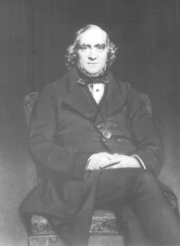 I just started reading The Pursuit of Reason, a history of the Economist researched and written over a 10-year period by Ruth Dudley Edwards and published on the occasion of its 150th anniversary in 1993. It’s a great read, and James Wilson, the founding editor, has a lot to contribute on the subject of free markets and free trade.
I just started reading The Pursuit of Reason, a history of the Economist researched and written over a 10-year period by Ruth Dudley Edwards and published on the occasion of its 150th anniversary in 1993. It’s a great read, and James Wilson, the founding editor, has a lot to contribute on the subject of free markets and free trade.
The paper was founded with the purpose of documenting the harm done by government tariffs, restrictions and subsidies, and arguing in favour of a laissez-faire political economy. It relied heavily on statistics and clear reasoning. It was uncompromising. Wrote Wilson in the issue of February 13 1846:
The more we reflect upon the experience of the past — the more we watch what is now going forward in this country, the more irresistibly are we brought to the conclusion that the only functions which a government can exercise with advantage to society are those connected with the maintenance of order, the peace and security of life and property, and the raising of the necessary funds for those objects; and, moreover, that whenever a government or the legislature step beyond those simple duties, they do so at the hazard of doing much more mischief than good.
Or, from the original prospectus (the preliminary number and prospectus of August 5 1843 make for fascinating reading):
… personal experience has shown us … that the people want no acts of parliament to coerce education or induce moral improvement when they are in physical comfort — and that, when men are depressed with want and hunger, and agonized by the sufferings of helpless and starving children, no acts of parliament are of the slightest avail.
It has long remained true to this mission. It still claims:
Established in 1843 to campaign on one of the great political issues of the day, the Economist remains, in the second half of its second century, true to the principles of its founder. James Wilson … believed in free trade, internationalism and minimum interference by government, especially in the affairs of the market.
Yet, when you open the Economist today, you might read things like this (in an article about the Australian elections):
The [central bank issued] a warning that inflation was likely to exceed 3% next year, suggesting more rises are on the way. Government spending, the bank added pointedly, was contributing to inflationary pressures.
Ignoring the warnings, [the prime minister,] Mr [John] Howard promised more than A$9-billion ($8-billion) more spending at his launch, on top of pledges costing A$43-billion since the campaign started. The most remarkable one was a tax rebate of up to A$800 for parents, regardless of income, to set against the cost of sending children to private schools, including fees, uniforms and excursions. If this was meant to trump Mr Rudd on an issue (education) he has made his own, it may not have worked. Economists and some school principals criticised the plan as welfare for the middle class; the money would be better spent, they argued, on fixing things in the schools themselves.
Since when does a self-professed free-market paper consider a tax rebate to constitute government spending, let alone a “most remarkable” example thereof? Since when is it preferable for a government to tax and spend, instead of permitting citizens to spend their own income for their own benefit? Since when is socialised education supplied by government preferable to private choices by individuals?
The Economist, sadly, has lost its way.


